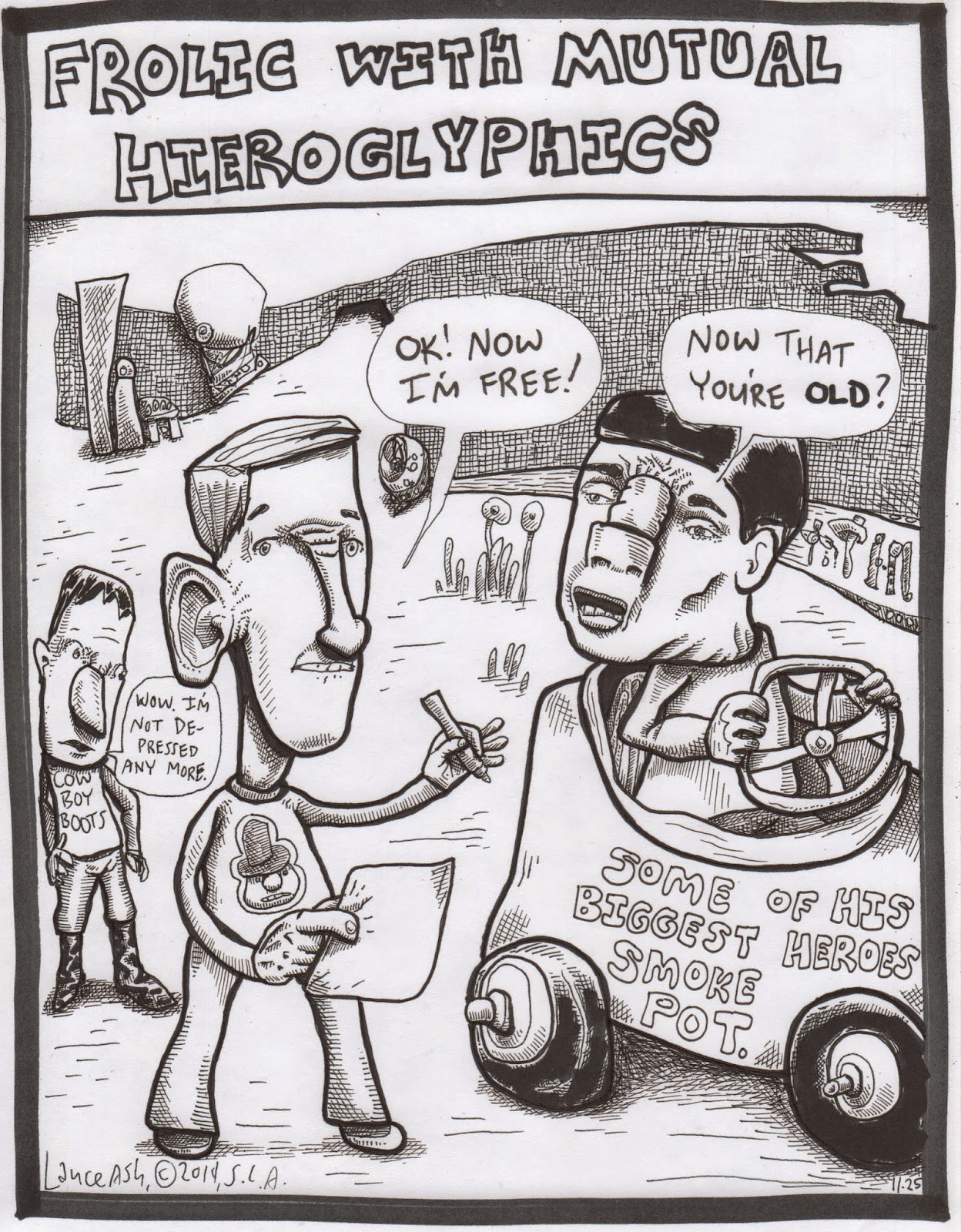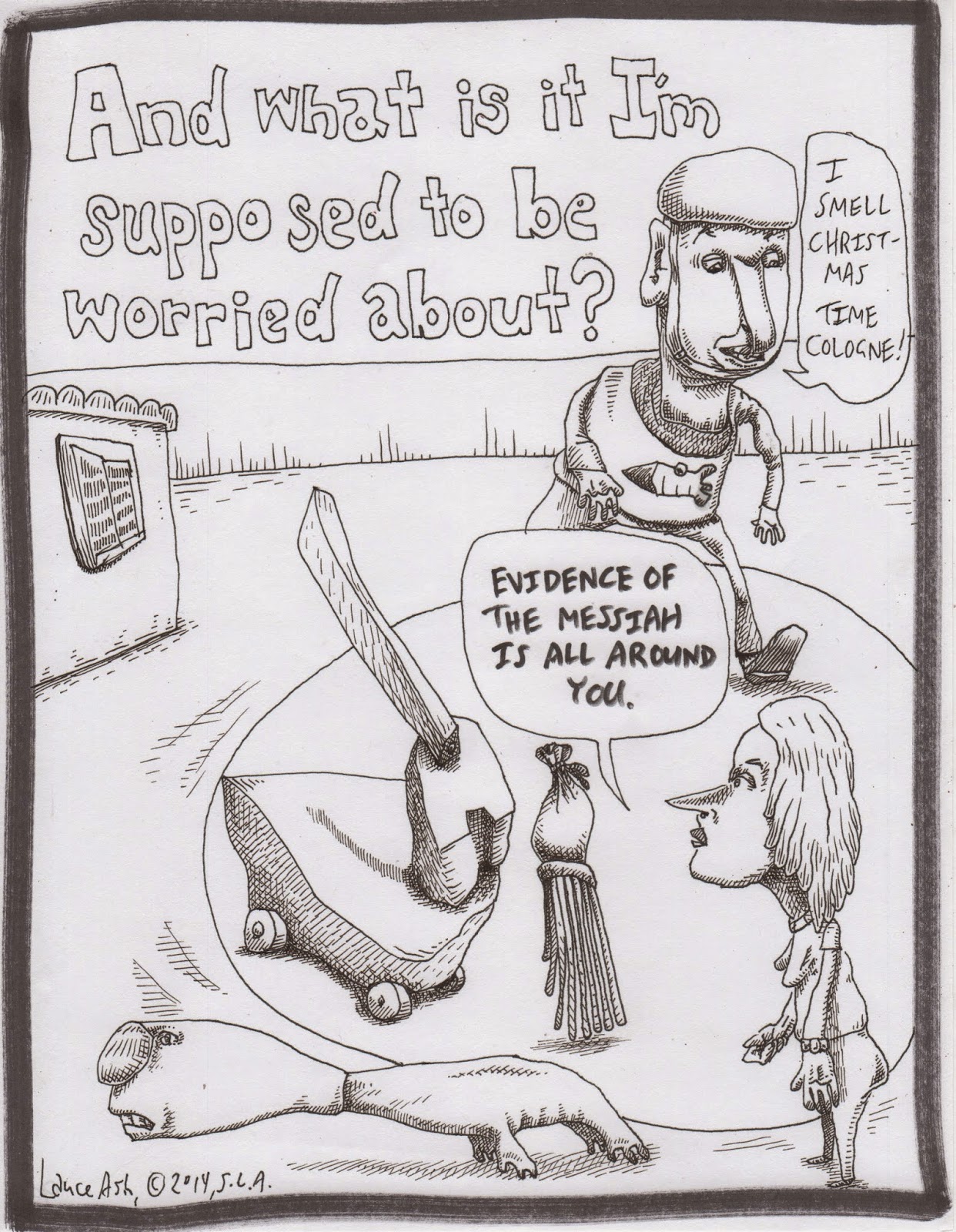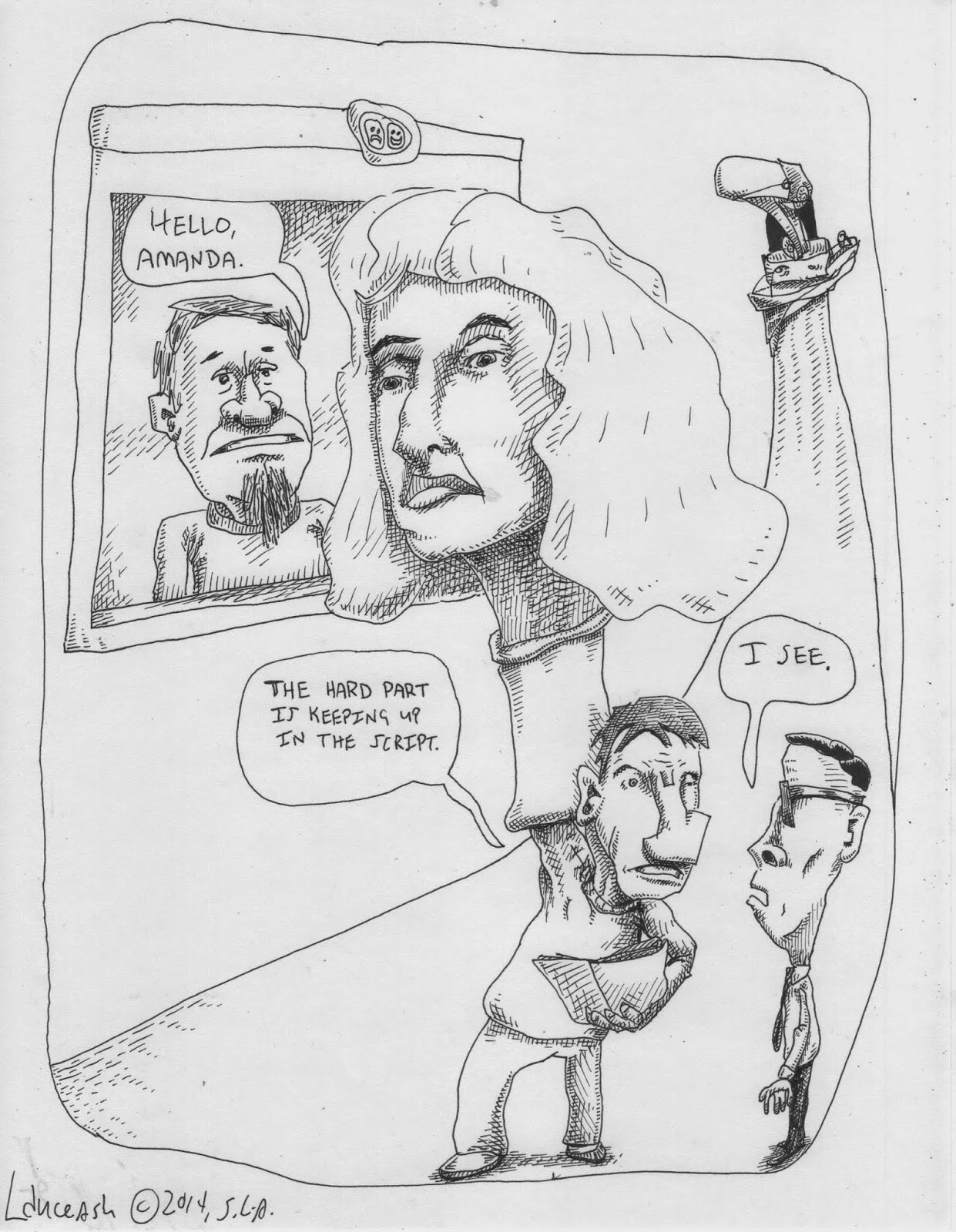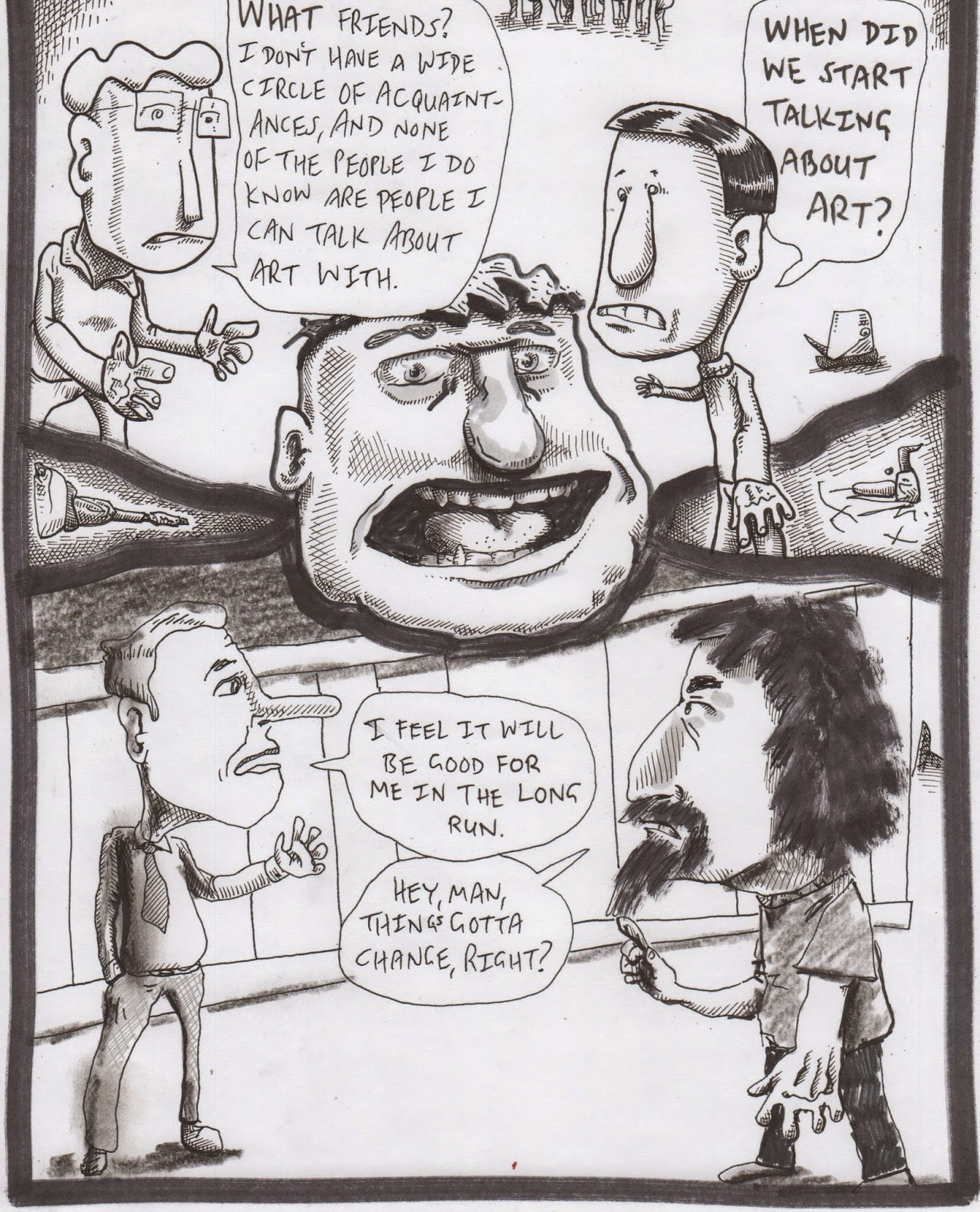A couple of poems
A very fine actor
Is Alfred Molina.
A place for your tractor
Is South Carolina.
History must judge
Cornelius Fudge.
Frolic with Mutual Hieroglyphics

Frolic with Mutual
Hieroglyphics
Pigmented
frost saturated the sides of Mr. Lurie’s art project. As he and a crowd of assistants and
sycophants stood about, debating what to do to correct the situation, the
gallery’s curator, Mr. Moore, emerged from his office onto the catwalk
overlooking the gallery floor.
“Come take
a look at this,” he called to me, his forearms on the railing.
“He calls
it the Sardine Stethoscope,” Moore informed me. I carried my mug of fancy green tea out of
the office and joined Moore
at the railing.
“I’m a
hypocrite,” I told Moore . “As we all are, naturally. I resent such indulgent tripe even as I am
guilty of doing the same type stuff.”
“Surely you
can’t compare your work with this.” Mr.
Moore bounced his forehead towards the installation, which was a large,
fabric-covered box.
“If you
don’t like it, then why do you have it in your gallery?”
“First of
all, it’s not my gallery; I’m just the curator. Second, I like Lurie; he’s a good guy,
even if his art is crap. Third, he’s a
famous name. If a Mr. Lurie wants to
spend his time between albums doing this sort of thing,” again Moore used his forehead as an unobtrusive
index finger, “Then his work acquires value, even if it’s only the value of
notoriety.”
I felt that
my tea was cool enough to drink. I had
never tried Patriot’s Umbrella. It was
supposed to be good; at least, according to an article in Samsasamsara magazine that
someone had told me about.
“How is
it?” Mr. Moore asked, smiling at my face of disgust.
“It has
tremendous snob appeal,” I replied, so tempted to dump the rest of my mug onto
the Sardine Stethoscope that I had to
cast my mind into a reverie to stop myself.
Ten years
earlier I was working at the Post Office, hoping that the facility I worked at
wouldn’t be shut down and my job transferred to a larger one in Atlanta , necessitating a
one-way commute of two hours. There
were those that I worked with who didn’t care if we were all shipped off the Atlanta : they either lived
in rental properties and could easily move closer to work or they didn’t have a
multi-faceted art career demanding a couple hours’ attention every day as I
did. I was a painter, a writer, a
cartoonist, and a musician. I felt that
everything depended on the maintenance of the routine I had established. Without my art, the many things that I did,
my life would be empty. I might as well
start going to church or take up drinking again.
Ten years
earlier the sunburst medallion given to me by the Fromme Emperor shrank to the
size of a soybean under the glare of the roadside halogens and, like a soybean,
passed easily and readily into my abdominal cavity, a place where organs slowly
settled into the sediment like a solar system in aspic. Sludge metal and its symbols of stasis…
After the
death of my semi-divine alter ego Toadsgoboad I was at a loss for some
time. I didn’t know how to go about
doing the things I had done under that name.
It was only after I realized that I was still Toadsgoboad despite reverting
to my birth name that I felt free to move forward. Of course, all the trappings of the
Toadsgoboad myth were gone, but the wider expanse of all existence was now
available. If I could but make use of
this source, my work would be the richer for it.
Ten years
earlier—I was listening to Swans and trying to penetrate its mysteries, trying
to familiarize myself with the material and master its burden. There were so many albums to work my way
through—and not just by Swans, but by dozens of other artists like Sonic Youth
and the Boredoms and Pere Ubu and Sixteen with the circle around the numeral.
Who knew
that I would revert to the telling of old-fashioned stories?
I Was Listening to Sonic Youth
I Was Listening to Sonic Youth & Contemplating Buying
a Lee Ranaldo Solo Album
“If ever
there can be truly such a thing as a solo album.”
“I take it
you don’t subscribe to the auteur theory then.”
“Decadence.” A voice from the back of the lecture hall.
“I haven’t
subscribed to anything in years. I think
the last thing was something like Juxtapoz
or National Review.”
“Two people
(essentially) just talking until they arrive at the truth, or at least
something interesting.”
“Henry
Miller said that he wrote to find out what he was writing about.”
“I don’t
care what Henry Miller said.”
“I don’t
give a shit what Henry Rollins has to say.”
“Blasphemy.”
“Decadence.” The same voice? Who was that?
I peered into the writing needs editing as much as painting does.
“You’re
supposed to say ‘darkness.’”
“I don’t
know exactly what I expected when I first started listening to Sonic Youth, but
I certainly didn’t expect to become intimately acquainted with ‘the
scene.’ I’ve never been a part of any
scene and I don’t think I ever will.”
“Unless
some group of admirers gathers around you like they did around Blake in his
elder years.”
“In the
digital age? Don’t fool yourself. Those days are over.”
“Perhaps if
you were to actually meet some people—“
“My isolation
is complete. All the happy accidents
have already happened.”
“It’s all
luck.”
“It’s all
luck. The best thing I can do, the only
thing I can do, is to keep doing what I have been doing: spending every
available minute creating work that pleases me.
I must purge every remaining impulse to conform to standards of audience
appeal.”
“Branford
Marsalis won’t like it.” The voice; this
time closer, somewhere nearer the portable risers on which my fellow chorus
members and I stood.
“Your
references are dead. No one knows what
you’re talking about.”
“Kim Gordon
is available.”
“How many
female bass players named Kim?”
“No one
knows what you’re talking about.”
No
remembers a voice.
Winky Salamander and His Salami of Winkiness
Stars of red, white, and silver covered Nijinxi’s black
velvet pants. He stood on his hands and
urinated into the toilet.
“All too
easy,” he declared, falling onto his bare feet.
His shirt, which had gathered around his wiry shoulders during the
exhibition, now fell back into place, revealing the picture of Jean Dubuffet on
its front.
“Who is
that?” Bocamel asked, pointing to the image of the founder of Art Brut.
Nijinxi
flushed the toilet with a graceful tap of his slender fingers, nails painted
black. His penis, but a coracle compared
to the ocean liners that plied the currents of the sexual sea, withdrew into
the darkness to hide, writing poetry about flightless automatic birds that
stalked the disused soccer field behind the library.
“You
Americans with your ‘soccer,’” Lord Ewing sneered. “The rest of the world calls it football.”
All too
true.
If only
there was a literary equivalent to Art Brut.
And Thus Was the Man Deeply Enmeshed in Painful Self-Expression

Her Tender Skin, Her
Legal Appetites (They Frightened Me with Their Sincerity)
As in a Thermal Dance of Commitment
Each tear making its way down the course of her cheeks
contained a full crew of pilots, engineers, navigators, and technicians. When later asked about the difference between
engineers and technicians at a press conference in the band’s suite, I was
evasive.
“You must
understand that while I am regressing, a deep and abiding silliness hovers
about me like a cloak reluctant either to warm my shoulders or lend an
appearance of authority to me.”
“Why
must we understand this?” asked Little Joe, called the White Boy in Bologni’s
sadly overlooked comic strip.
I nodded;
the band, already confused by Jim Morrison’s presence, or absence, nodded in
return, committing themselves to nothing, but open to suggestions.
“Why don’t
you tell us about one of your many acquaintances?”
Chocolate
inconsiderate, up and down, wasting half his time in pointless socializing, the
mind no longer interested in much of anything besides the satisfaction of
physical needs and the avoidance of unpleasantness. My dreams are like an orange gymnastics mat,
providing a soft background for the day’s blind fumbling.
“He’s
really more a poet than anything else.”
What I am
is something I didn’t plan, didn’t expect.
The kind of painter, the kind of writer I am is apparently beyond my
control. I really have nothing to say
and yet I will say it anyway.
The Inside Mechanics of the Left Elbow and How it Hurts
A
smattering of interest in the old ways among the impatient festivalgoers
resulted in the publishing of Lord Ewing’s Nocturnal
Archie Shepp Wanderling, a collection of poem-like pieces accompanying
intricate diagrams of total bullshit machinery.
This alone was enough to enrage Harlem Infreque, one of the original
Nabiscope. The band now calling itself
Nabiscope has but a single member with any link to Harlem Infreque and the
other three originals. Such trivia
enrages you, you say? I can
understand. The Council on Foreign
Medicine has hired me to explain the similarities between Lord Ewing’s book and
that as-yet-unpublished by Infreque. Its
limited budget should not be squandered on lecturers who waste time with the
kind of details that only a fan would appreciate. However, before I go on, I must confess that
I am just such a fan. I even
still listen to whole albums. Well, I
try to. For example, just now, I skipped
a track on an Iggy Pop album. The song
didn’t specifically reference his over-rated penis, so I felt no need to
subject myself to it.
Of course,
the obvious similarity between the two books is that each is composed primarily
of short pieces of writing that resemble poems in many respects, accompanying
illustrations of objects which, although clearly machines, yet have organic
qualities. What is not so obvious is the
fact that both books are veiled commentaries on the life and work of Charles
Mingus. Harlem Infreque and his
bandmates often cited Mingus as a major influence on their own, nervously
gelatinous music (said to resemble a Danish youth bouncing around in his
folding chair at an early David Bowie concert).
Recent investigations by the Lost Eighth Percent Movement, the
enforcement arm of the Council on Foreign Medicine have discovered that Lord
Ewing also has a connection to the late bassist and composer: He is, in fact,
Eric Dolphy reincarnated as a white man, but without the sandals.
My own
analysis of the situation is colored by an indifference of orchestral
proportions as to whether or not anyone in this crowd of Danish youths and
professional colleagues and fellow fans of the Booger Metal genre, of which
Nabiscope was arguably its finest example, is persuaded of anything I might
have to say on this subject or related subjects. That being said, I must admit that I am
an analyst of situations just such as this, making my way from day to day,
enduring the pain and lack of full mobility with all the aplomb demanded of a
member of the Royal Society of Subjective Situation Analysts. My sunglasses, I’ve left them on the
piano! There they are in that archival
footage from some earlier festival, clearly visible between Bud Powell and a
trombone case. That trombone case, by
the way, doesn’t contain a trombone. No
telling what Eric Dolphy might have accomplished.
Not Even a Magnetbox Can Contain the Self-Conscious
Hexagram
No one knew
what to make of the diagram until Moof suggested we look at it upside down.
“It’s a
cake!” Chandra ejaculated. She ejaculated. She ejaculated her words like a
mighty, live-giving burst of seminal fluid crowded with wriggling
man-tadpoles. Several of us in the crowd
of diagram interpreters exchanged glances and juvenile grins.
“That’s
enough, that’s enough,” growled Captain Begottomy, pushing his way to the front
with his heavily tattooed paddlehands.
He stood with his snout only inches from the framed diagram. “I see nothing to snigger about,” he
commented. “It’s only a cake.”
“It’s not a
cake,” I objected. “It’s an
architectural machine.”
“Get your
minds out of the gutter, boys,” Captain Begottomy advised. His enormous, lumpy body was ambulatory only
with the help of the gravity-defiance suit.
“Do you
see?” I pointed to several details in the technical illustration. “It’s an architectural machine.”
“Why can’t
it be a cake too?” Chandra wondered.
“It can,” I
admitted. “But its general inedibility
negates any perception of cakiness in the mind of the average person.” I waved at the window, outside of which were
to be found these average persons.
“You’re all
a bunch of dirty-minded children,” Begottomy accused, whipping halfway around
in a gelatinous undulation to glare at us out of one eye. (He had four)
“Wait a
minute,” Palmeira begged. “Is this a diagram or a technical
illustration?”
“Well, technically speaking,” I later repeated
for the benefit of the committee, “It’s
a cartoon, but that’s only because its accompanying text forms a caption of
sheer meaninglessness.
“He and his hippie companions have only one thing on their minds:” the Captain delivered his testimony by way of sub-etheric wave transmitter. “Dirty, kinky sex with no intention of ever repopulating the planet.”
“He and his hippie companions have only one thing on their minds:” the Captain delivered his testimony by way of sub-etheric wave transmitter. “Dirty, kinky sex with no intention of ever repopulating the planet.”
PDOPD-97-100!


The Women of Elder
Diaphragm
When I
first proposed a tribute of sorts to the women of Elder Diaphragm, some of my
friends thought I was talking about the Deal Sisters. Perhaps I disabused them of this notion with
unnecessary heat, but their confusion seemed a humorous put-on, one calculated
to piss me off.
“I don’t
know what you got so upset about,” one of my friends, the one in the Opeth
t-shirt, later grumbled as we examined our vending options. “They smoke and they have brown teeth.”
“Hey!” I
snapped, causing my friend to push the wrong button. Instead of a bag of Funyons, he got some new
kind of potato chips apparently made with Kellogg’s Special K, judging by the
packaging.
Note: Kellogg’s has the sound of breakfast about it.
“It’s rare
that I find anyone in the… Arts,” I threw my hands out in deference to the
word’s imprecision and general lack of suitability, “That I both like and
respect—“
“I bet you
wouldn’t like them if you actually met them,” my Opeth friend interjected,
sniffing the contents of the incorrect purchase. Should he add milk?
I sighed,
more a huff, really.
“And even
rarer that it happens to be a woman,” I continued.
“And twins
at that,” Opeth man added.
I walked
away, leaving him to sort out his snack.
“So who are
these ‘Women of Elder Diaphragm,’” another friend asked as I puzzled over the
Pixies once again.
The story,
as told to me one crazy night when the number in the circle, taken as a
symbolic whole, corresponded to characters neither described as yet nor firmly delineated
as either real or fictional: “Sometimes,” the old man began, “A character can
be both real and fictional at the same time.”
“Bullshit! Bullshit!
Bullshit!” I screamed, running outside with my hands over my ears, loath
to hear such heresy.
Such looseness of form, a hallmark of MODERNISM, with all of its attendant evils, like stream-of-consciousness and amorality, was beyond my comprehension. I didn’t even know the difference between Kim and Kelley at that time.
Such looseness of form, a hallmark of MODERNISM, with all of its attendant evils, like stream-of-consciousness and amorality, was beyond my comprehension. I didn’t even know the difference between Kim and Kelley at that time.
.
.
.
.
PDOPD-supplementary material
Laser Fruitcakes Ignore the Omnibus
The beard
descending from Astercore’s left eye was a latticework of resin-reinforced
seaweed and twigs, containing platforms at regular intervals that provided
shelter for many of the onion rings now held in common by the Children of
Venable. Tarzan, with infallible
judgment, had built a small observatory on the uppermost of these platforms.
“Any lower
down and our vision would be obstructed,” he explained to an awestruck pair of
documentary filmmakers from several bodies away. Their newspaper, The Harbison Obsolete Medium, tasted bad unless you’d been raised
to appreciate such an exclusive focus on the tongue’s bitterness
receptors. Tarzan’s picture on the front
page would be seen as a naked ploy to win sympathy for the conservatives, but
current editorial thinking was that identification with the roots of popular
culture was worth the risk.
Arthur
Lamont, the journalist wearing glasses, was not wedded to his employer’s devotion
to antiquity. He had no qualms about
using a digital recorder to document the jungle lord’s comments. However, as Tarzan seemed to find the
technology frightening on a race memory level, Arthur was forced to scribble
down an approximation of what he heard.
The other
journalist, the one with the beard and hair parted in the middle, was Thurber
Turmek, officially the photographer on the assignment, but, as, again, Tarzan
did not understand and therefore feared the simplicity and miniaturization of
the camera Turmek proposed to use, he was left to wander around the
instrument-crowded platform, wondering if he could jump off the side and
survive unscathed, like on some cartoon.
Meanwhile
(and isn’t it always meanwhile with one person in one place and somebody
else in another?) Sunday Medson stood in the doorway of the bathroom of her
suite at the Whittington hotel and smiled at all of this novel luxury. She was more stoned than she had been in some
days, but that does not fully account for the intense pleasure she took in
looking at this boxful of furniture and décor.
No, what made it so deeply pleasurable, like the circular mental
satisfaction of an individual truism, was that this was all hers for free.
The Blad
Foundation, so went Sunday Medson’s cannabis-altered ruminations, chose the
wrong person when they chose me. I don’t
give a rat’s ass about their “mission” to present the historical legacy of the
days of the old religion. She frowned. That was something that could bring her
down. All that wasted time and
effort. Years ago. Years before her time. Damn, she felt she needed another hit off her
bong. But she needed to ration her
stash.
When Arthur
Lamont interviewed himself, his imaginary interviewer was a nondescript
journalist vaguely of the Kurt Loder type (during Loder’s MTV days), but
younger, and genuinely curious. He
usually sat next to Arthur in the car while Arthur drove and posed questions which
Arthur answered out loud. Had Sunday
Medson known this about the seemingly straight-arrow Arthur Lamont, she would
have been surprised. She might even have
offered him a joint, but his recent identification with the Blad Foundation and
espousal of its “beliefs” had made her wary.
Salvatore
Remmick, the imaginary interlocutor of Arthur Lamont, asked Lamont about his relationship
with Sunday.
“I knew her
in the old days, back…” he paused, indicated with his thumb the road already
traveled, “In the old place.” He
swallowed and thought hard. There was
always the possibility that Salvatore Remmick would interject something,
something perhaps presciently leading, but Arthur knew he would wait.
“We were
colleagues. We’re colleagues now. But,” he paused. “I don’t know if we’re closer now, despite
there being a definite, employment-mandated wall between us, than we were back
then or not.”
“So, she’s
just a co-worker,” Remmick tried it out.
Arthur
cocked his head to one side.
“Well, if
you’re asking does she, or does she not, figure as a… figure in my
self-conceived mythology, well then, I guess she would have to, wouldn’t she?”
Arthur admitted.
Remmick
asked, “What role or characterization does she fulfill? Or say, play, what role does she play?” He was a funny sort of person, now that you
had a chance to examine him. He didn’t
look like a fully fleshed-out human being, but rather like a comic
drawing. Maybe by Charles Saxon or a
funhouse version of Charles Schulz.
Arthur turned his attention back to the road.
Fingerless Gantry
En Route
Arthur had
borrowed the team’s car for the day. His
imaginary interviewer, whose name was that of an actual rock journalist that
Lamont had seen on some documentary, probably the Pixies, was, like his
namesake, a slightly overweight (at least by rock standards) man in his late
twenties or very early thirties who had enjoyed some modest success in his
hometown playing bass in a band called Slothful Cabarello and genuinely did not
care which gender of human he had sex with.
All of this, of course, was an unopened book to Arthur, for whom Salvatore
Remmick was really nothing more than a flickering image, coming into
corporeality beside him in the car, or floating in the aquarium of his mind,
across a poorly laminated table in a rock star’s hotel room.
“Keep your
eyes on the road, please,” Remmick advised Arthur with uncharacteristic
caution.
The
atmospheric subtleties of the quieter aspects of Caspar Brötzmann’s music. Can you imagine any icier art to accompany it
than the depictions of corporate success in 1980’s illustration? Even art depicting its contemporary
antithesis: the concrete and glass utopia of East Germany .
“You wish
you had been a rock star?” Remmick interrupted Arthur’s thoughts.
“I am
a rock star,” Arthur countered. “Or else
you couldn’t be interviewing me.”
“Yes, your
band, the Driblets, it’s mostly composed of persons such as yourself, your age
group, your income bracket, your level of actual experience in the music
business, isn’t that true?”
“You know,”
Arthur shook his finger, cooking up a retort of Krebs Cycle-like
complexity. “I don’t know if you’ve ever
heard of Nadar, he—“
“Yes, I
know who Nadar was. Late 1800’s,
photographer.”
“Good, I
won’t have to explain that. Well, do you
know what his Pantheon was?”
“For the
sake of moving things along, yes, I do.”
“Excellent. You are most helpful. Anyway, imagine all of those people in the Pantheon, almost all of them
writers. Think of all the journalism
created by those men. Most of that
newsprint, most of those words, still exist, they’ve been archived somewhere. You can go and find it and read it. And you know what?” Arthur demanded.
“99%
doesn’t amount to a hill of shit,” Remmick returned flatly.
“Oh, you’ve
heard this theory before?” Arthur looked taken aback, even as he deliberately
ran over a bag filled with someone’s Burger King remains.
Subscribe to:
Comments (Atom)































